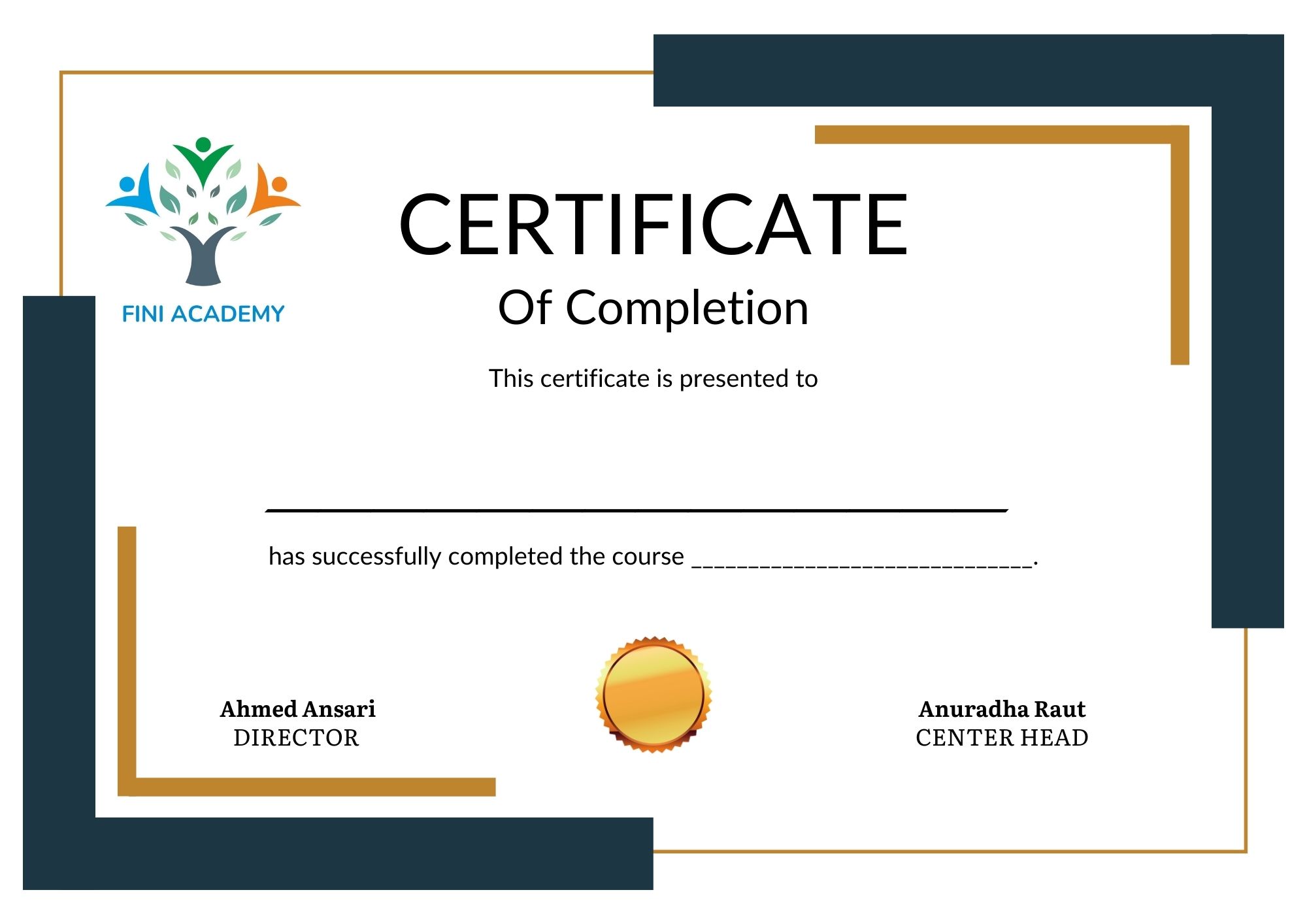- +91 90280 94499
- info@finiacademy.com
- info.finiacademy@gmail.com
 In an Oracle Performance Tuning course, you will learn how to optimize the performance of Oracle databases. This includes understanding how to identify and resolve performance bottlenecks, use Oracle's built-in tools like AWR (Automatic Workload Repository) and ADDM (Automatic Database Diagnostic Monitor), and analyze SQL execution plans. You'll also explore techniques for tuning SQL queries, memory management, optimizing database storage, and managing resources effectively. The goal is to ensure that the Oracle database operates efficiently, minimizing delays and improving overall system performance.
In an Oracle Performance Tuning course, you will learn how to optimize the performance of Oracle databases. This includes understanding how to identify and resolve performance bottlenecks, use Oracle's built-in tools like AWR (Automatic Workload Repository) and ADDM (Automatic Database Diagnostic Monitor), and analyze SQL execution plans. You'll also explore techniques for tuning SQL queries, memory management, optimizing database storage, and managing resources effectively. The goal is to ensure that the Oracle database operates efficiently, minimizing delays and improving overall system performance.
The Oracle Performance Tuning course aims to equip participants with the skills to optimize the performance of Oracle databases. It covers key concepts like identifying bottlenecks, understanding system resource utilization, and using Oracle tools to analyze and resolve performance issues. The course also teaches best practices for SQL query optimization, efficient use of indexes, memory management, and troubleshooting techniques to ensure high database performance and availability. The goal is to enable participants to enhance system responsiveness, scalability, and overall efficiency.
The Oracle Performance Tuning course teaches how to optimize Oracle databases for better performance. It covers diagnosing issues, tuning SQL queries, indexing, and optimizing memory usage. You'll learn to use tools like AWR and SQL Tuning Advisor to improve database efficiency and resolve bottlenecks
Module 1: Introduction
 The top-down approach to tuning
The top-down approach to tuning The history of Oracle tuning
The history of Oracle tuning A review of the Oracle architecture
A review of the Oracle architecture The goals of Oracle tuning
The goals of Oracle tuning Overview of SQL tuning
Overview of SQL tuning Oracle network bottlenecks
Oracle network bottlenecks Oracle RAM usage and bottlenecks
Oracle RAM usage and bottlenecks Oracle CPU usage and bottlenecks
Oracle CPU usage and bottlenecks Oracle disk I/O overview
Oracle disk I/O overview Monitoring server (sat, vmstat, top, glance)
Monitoring server (sat, vmstat, top, glance) Movement toward server consolidation
Movement toward server consolidation Exercise: Monitor CPU
Exercise: Monitor CPUModule 2:Oracle disk I/O tuning
 History of DASD
History of DASD Understanding disk I/O
Understanding disk I/O Monitoring disk I/O (AWR, dba_hist_filestatxs)
Monitoring disk I/O (AWR, dba_hist_filestatxs) Sorted hash cluster tables
Sorted hash cluster tables Disk I/O waits
Disk I/O waits Oracle data buffer internals (db_cache_size)
Oracle data buffer internals (db_cache_size) Caching data blocks in the PGA (parallel full-table scans)
Caching data blocks in the PGA (parallel full-table scans) Blocksize and I/O performance
Blocksize and I/O performance Exercise – view tablespace fragmentation
Exercise – view tablespace fragmentationModule 3: Oracle CPU Tuning
 Finding your cpu_count
Finding your cpu_count Measuring CPU usage with vmstat
Measuring CPU usage with vmstat Oracle CPU usageUsing processor affinity_optimizer_cost_model=cpu
Oracle CPU usageUsing processor affinity_optimizer_cost_model=cpu Parallel query and CPU
Parallel query and CPU Exercise: Timing a parallel query
Exercise: Timing a parallel queryModule 4: Oracle RAM Tuning
 all_rows and first_rows optimization and RAM
all_rows and first_rows optimization and RAM Multiple data buffers
Multiple data buffers Multiple blocksizes
Multiple blocksizes Measuring RAM paging
Measuring RAM paging Oracle SGA RAM
Oracle SGA RAM Oracle PGA RAM
Oracle PGA RAM Using the KEEP pool
Using the KEEP pool Automatic Memory Management (AMM)
Automatic Memory Management (AMM) Exercise: Use the KEEP pool
Exercise: Use the KEEP poolModule 5: Oracle InstanceTuning
 Global tuning techniques
Global tuning techniques Display possible unnecessary large-table full-table scans
Display possible unnecessary large-table full-table scans Library cache tuning
Library cache tuning Finding missing indexes Tuning the database writer instance parameter tuning
Finding missing indexes Tuning the database writer instance parameter tuning Exercise – change optimizer parameters
Exercise – change optimizer parametersModule 6: Oracle SQL Tuning Introduction
 SQL tuning hierarchy SQL tuning
SQL tuning hierarchy SQL tuning goals optimizer modes query
goals optimizer modes query re-write cursor_sharing viewing
re-write cursor_sharing viewing execution plans (autotrace)
execution plans (autotrace) verifying optimal join techniques parallelizing SQL execution
verifying optimal join techniques parallelizing SQL execution dynamic statistics
dynamic statistics Exercise – count times when a table is invoked
Exercise – count times when a table is invoked 12c new SQL features
12c new SQL features function-based virtual column
function-based virtual column adaptive execution plans
adaptive execution plans 12c new optimizer metadata collection features
12c new optimizer metadata collection featuresModule 7: AWR and ASH
 AWR vs STATSPACK
AWR vs STATSPACK Reading an AWR report
Reading an AWR report AWR report analyzer
AWR report analyzer Basics of predictive modeling for performance
Basics of predictive modeling for performance Finding repeating signatures of data
Finding repeating signatures of dataModule 8: Oracle RAC Tuning
 RAC architecture tuning
RAC architecture tuning Tuning disk I/O on RAC
Tuning disk I/O on RAC Tuning the cache fusion layer on RAC
Tuning the cache fusion layer on RACModule 9: Oracle Tuning Pack
 creating SQL Profiles
creating SQL Profiles Recommending new indexes
Recommending new indexes “automatic” SQL Tuning
“automatic” SQL Tuning SQL Performance Advisor (SPA)
SQL Performance Advisor (SPA) recommending object reorganization
recommending object reorganizationModule 10: Oracle Diagnostic Pack
 AWR and ASH
AWR and ASH Real time SQL monitoring
Real time SQL monitoring Comparing performance periods
Comparing performance periods Oracle monitoring & alert notifications (setting thresholds)
Oracle monitoring & alert notifications (setting thresholds)Module 11:Oracle Tracing
 10046 tracing
10046 tracing TKPROF tracing
TKPROF tracing Trace analyzer
Trace analyzer Autotrace
AutotraceModule 12: Introduction to SQL Tuning
 Pre-SQL database communications
Pre-SQL database communications The evolution of SQL
The evolution of SQL Declarative languages
Declarative languages Exercise – Show permutations of the same query
Exercise – Show permutations of the same queryModule 13: Optimizing Oracle SQL
 Parsing a SQL statement Semantic parsing
Parsing a SQL statement Semantic parsing Hard parse vs. soft parse
Hard parse vs. soft parse Decision tree generation
Decision tree generation Making SQL reentrant
Making SQL reentrant Exercise – generate a syntax and semantic error
Exercise – generate a syntax and semantic errorModule 14: Optimizer Statistics
 Types of metadata
Types of metadata Index metadata
Index metadata Segment metadata
Segment metadata Server metadata
Server metadata System stats
System stats Exercise run dbms_stats
Exercise run dbms_statsModule 15: Exposing & Reading Execution Plans
 autotrace
autotrace SQL*Trace
SQL*Trace Determine the steps of an execution plan
Determine the steps of an execution plan Exercise: determine the sequence of steps in a complex execution plan
Exercise: determine the sequence of steps in a complex execution planModule 16: Alerting Execution Plans
 Changing CBO statistics
Changing CBO statistics Changing init.ora SGA parameters
Changing init.ora SGA parameters Changing optimizer parameters
Changing optimizer parameters Using hints
Using hints Using the opt_param hint
Using the opt_param hintModule 17: Oracle Indexing
 Overview of Oracle
Overview of Oracle indexing bitmap indexes
indexing bitmap indexes bitmap join indexes
bitmap join indexes guidelines for creating indexes
guidelines for creating indexes function-based indexes (FBI)
function-based indexes (FBI) index usage monitoring
index usage monitoring fishing in the library cache
fishing in the library cache optimizing indexes
optimizing indexes The transient nature of indexing database
The transient nature of indexing database modality of workloads
modality of workloads SQL Workload analysis
SQL Workload analysis Identifying EOW, EOM and EOY SQL.
Identifying EOW, EOM and EOY SQL. Creating on-demand indexing oracle
Creating on-demand indexing oracle text indexes
text indexes Exercise – create an index on the pubs database
Exercise – create an index on the pubs databaseModule 18: Boolen / Built-in Functions
 Boolean evaluation
Boolean evaluation Decode and case
Decode and case Basics of BIFs
Basics of BIFs Function-based indexing
Function-based indexing Creating a custom BIF using PL/SQL
Creating a custom BIF using PL/SQL The effect of BIFs on SQL execution
The effect of BIFs on SQL execution Exercise: Write a custom built-in function
Exercise: Write a custom built-in functionModule 19: Tuning Oracle Sorting
 Basics of sorting
Basics of sorting RAM usage in a hash join
RAM usage in a hash join RAM for indexes
RAM for indexes Use indexes to avoid sorts
Use indexes to avoid sorts Sorts in execution plans
Sorts in execution plans Sorts in semi joins
Sorts in semi joins Use autotrace to see sorts
Use autotrace to see sorts What causes sorts?
What causes sorts? PGA and sorting
PGA and sorting super-sizing your PGA to avoid disk sorts
super-sizing your PGA to avoid disk sorts sorted hash clusters
sorted hash clusters Exercise: avoid sort by retrieving data in pre-sorted order
Exercise: avoid sort by retrieving data in pre-sorted order Exercise: Use an “index” hint to avoid sort
Exercise: Use an “index” hint to avoid sortModule 20: Tuning Oracle Sub-queries
 Subquery overhead Scalar subqueries
Subquery overhead Scalar subqueries In-Line views
In-Line views Correlated vs non-correlated subqueries
Correlated vs non-correlated subqueries WHERE clause query re-write
WHERE clause query re-write Tuning IN and NOT IN subqueries
Tuning IN and NOT IN subqueries Tuning EXISTS subqueries
Tuning EXISTS subqueries Tuning correlated subqueries
Tuning correlated subqueries Using subquery hints (push_subq)
Using subquery hints (push_subq) Avoiding subqueries
Avoiding subqueries Non-correlated subqueries and NOT IN clause
Non-correlated subqueries and NOT IN clause Automatic rewrite of EXISTS subqueries
Automatic rewrite of EXISTS subqueries The merge_aj hint
The merge_aj hint The anti-join hints
The anti-join hints Exercise: Tune a subquery
Exercise: Tune a subqueryModule 21: Tuning with Temp Objects
 Tuning with temporary tables
Tuning with temporary tables Oracle global temporary tables (GTT)
Oracle global temporary tables (GTT) The Oracle SQL WITH clause
The Oracle SQL WITH clause Exercise: Test query rewritten to use temp tables
Exercise: Test query rewritten to use temp tablesModule 22: Tuning Full-table scans
 Basics of file multiblock I/O
Basics of file multiblock I/O Deciding when to invoke full-table scan
Deciding when to invoke full-table scan RAM caching in the SGA
RAM caching in the SGA Automating table caching (KEEP Pool)
Automating table caching (KEEP Pool) Solid State Disks and full-table scans
Solid State Disks and full-table scans Using plan9i.sql to find full-table scans
Using plan9i.sql to find full-table scans Tracking full-scans over time with AWR
Tracking full-scans over time with AWR Exercise: Find high disk read SQL
Exercise: Find high disk read SQLModule 23: Tuning Parallel Query
 Parallel query
Parallel query Parallel DML
Parallel DML Parallel DDL
Parallel DDL Parallel utilities
Parallel utilities Setting optimal parallel degree
Setting optimal parallel degree RAC and parallel query
RAC and parallel query Parallel query tuning and buffering
Parallel query tuning and buffering Parallel query hints
Parallel query hints Exercise: Invoke parallel query
Exercise: Invoke parallel queryModule 24: Oracle Optimizer goals
 Roadblocks to SQL tuning optimizer_index_cost_adj
Roadblocks to SQL tuning optimizer_index_cost_adj Global changes and SQL tuning (parameters, statistics,reorganizations)
Global changes and SQL tuning (parameters, statistics,reorganizations) Using the rule-based optimizer as a testing tool
Using the rule-based optimizer as a testing tool Configuring the optimizer
Configuring the optimizer Changing optimizer_mode
Changing optimizer_mode Governors for the optimizer
Governors for the optimizer Using hidden parameters
Using hidden parameters Using the opt_param hint
Using the opt_param hint gathering workload statistics
gathering workload statistics optimizer_cost_model
optimizer_cost_modelTechnical Skills:
Teaching Skills:
Communication Skills:
Problem-Solving Skills:
Interpersonal Skills:
At FINI Academy, we understand that organizations need tailored training solutions to keep their teams competitive and up-to-date with the latest technological advancements. Our corporate training programs are designed to meet the unique needs of businesses, enhancing the skills of their workforce to drive innovation and efficiency.
We offer bespoke training programs that are specifically designed to align with your company’s goals and objectives. Our expert instructors work closely with you to understand your needs and develop a curriculum that addresses your specific challenges and requirements.
Industry-Relevant Curriculum Our training programs are crafted by industry experts and cover the latest trends, tools, and technologies. This ensures that your team acquires skills that are immediately applicable in the workplace.
Flexible Scheduling We offer flexible scheduling options to accommodate the busy calendars of your employees. Training sessions can be conducted at your premises, at our institute, or online, depending on what suits your organization best.
Hands-On Learning Our training emphasizes practical, hands-on learning experiences. Through real-world projects and case studies, participants gain valuable insights and the ability to apply what they’ve learned directly to their work.
Expert Instructors Our instructors are seasoned professionals with extensive industry experience. They bring practical knowledge and insights into the training sessions, making learning both engaging and impactful.
Continuous Support We provide ongoing support to ensure the success of your training initiatives. This includes post-training follow-ups, access to resources, and the availability of our instructors for any further guidance or clarification needed.
Every organization is different, and so are its training needs. Whether you are looking to upskill a small team or roll out a large-scale training initiative, we can tailor our programs to meet your specific requirements. We also offer the flexibility to focus on particular topics or technologies that are most relevant to your business.
Investing in your team’s development is crucial for staying competitive in today’s fast-paced tech landscape. Partner with FINI Academy to equip your employees with the skills they need to excel. For more information on our corporate training programs or to discuss your specific needs, please contact us at info@finiacademy.com, info.finiacademy@gmail.com or call 9028094499.
We look forward to working with you to achieve your training and development goals.
=> Our mission is to provide high-quality software training that equips students with the skills needed to excel in the tech industry.
2. Where is the institute located?=> We are located at Shop no. 2s1-16, 1st floor, konark indrayu, above HDFC bank, Meeta Nagar, Kondhwa, Pune, Maharashtra 411048. You can find detailed directions on our Contact Us page.
3. What courses do you offer?=> We offer a variety of courses including web development, data science, machine learning, mobile app development, and more. Check our Courses page for a full list.
4. What is the duration of each course?=> Course durations vary. Most of our courses range from 4 to 12 weeks. Please refer to the specific course details for more information.
5. Are the courses online or in-person?=> We offer both online and in-person courses to accommodate different learning preferences and schedules.
6. What are the prerequisites for enrolling in a course?=> Prerequisites vary by course. Some courses require basic programming knowledge, while others are designed for beginners. Please check the course details for specific requirements.
7. How do I enroll in a course?=> You can enroll in a course by visiting our website, selecting your desired course, and following the enrollment instructions. Alternatively, you can contact our admissions office for assistance.
8. What is the admission process?=> The admission process typically involves filling out an application form, meeting any prerequisites, and making a payment to secure your spot. Some advanced courses may require an interview or assessment.
9.Who are the instructors?=> Our instructors are industry professionals with extensive experience in their respective fields. You can read more about our instructors on our Faculty page.
10. What materials are provided for the course?=> Course materials, including lecture notes, assignments, and software tools, will be provided. Some courses may require additional textbooks or resources, which will be specified in the course details.
11. Will I receive a certificate upon completion?=> Yes, you will receive a certificate upon successful completion of the course.
12. Is there job placement assistance after completing the course?=> We offer job placement assistance, including resume workshops, interview preparation, and connections to our network of industry partners.
13. Can I retake a course if I don’t pass?=> Yes, we allow students to retake courses. Please contact our admissions office for details on retake policies and fees.
14. What should I do if I encounter technical issues during an online course?=> For technical support, IT support team always help during this period. We are available to assist you during business hours.
15. How can I contact the institute for more information?=> You can reach us via email at , , by phone at 9028094499, or through our Contact Us page.
16. What are the office hours?=> Our office hours are Monday to Saturday , 9 AM to 6 PM.
At FINI Academy, we strive to offer flexible and convenient scheduling to accommodate the diverse needs of our students. Our courses are designed to provide a balance between comprehensive learning and manageable time commitments.
We are committed to providing high-quality education and are always available to assist you in selecting the course and schedule that best fits your needs.
Curriculum Development:
Training Delivery:
Technical Expertise:
Assessment and Feedback:
Mentorship and Support:
Continuous Learning:
At FINI Academy, we value the feedback of our students as it helps us to continuously improve and maintain the high standards of our training programs. Below are some general insights based on student experiences:
Course Content Our students appreciate the comprehensive and up-to-date curriculum that aligns with current industry standards. The blend of theoretical knowledge and practical application ensures that participants are well-prepared for real-world challenges.
Instructors Students consistently praise our instructors for their expertise, approachability, and dedication. Our instructors are industry professionals who bring valuable real-world insights to the classroom, enhancing the learning experience.
Learning Environment Both our online and in-person classes are designed to be interactive and engaging. Students have highlighted the supportive and collaborative atmosphere that fosters effective learning.
Course Materials The provided course materials, including lecture notes, assignments, and resources, are well-received for their clarity and relevance. Students find these materials instrumental in reinforcing their learning and aiding in the application of concepts.
Support Services Our support services, including technical assistance and career guidance, are highly valued by students. The availability of job placement assistance and resume workshops has been particularly beneficial for those seeking to advance their careers.
Flexibility The flexible scheduling options are appreciated by students who are balancing their studies with other commitments. The ability to choose between online and in-person classes offers added convenience.
Overall Satisfaction Overall, students express a high level of satisfaction with our courses. Many have noted significant improvements in their skills and career prospects following the completion of our programs.
We are grateful for the positive feedback and are committed to continually enhancing our offerings based on student input. We invite prospective students to join us and experience firsthand the quality education that FINI Academy provides.


Full stack WEB development is the process of developing both the frontend and backend of applications. Any application has a frontend (user-facing) component and a backend (database and logic) component.

A full-stack Java developer is a web programmer who uses Java, a popular computer programming language. Three layers of application: front-end, back-end and database layer.

DevOps is the combination of practices and tools designed to increase an organization's ability to deliver applications and services faster than traditional software development processes.